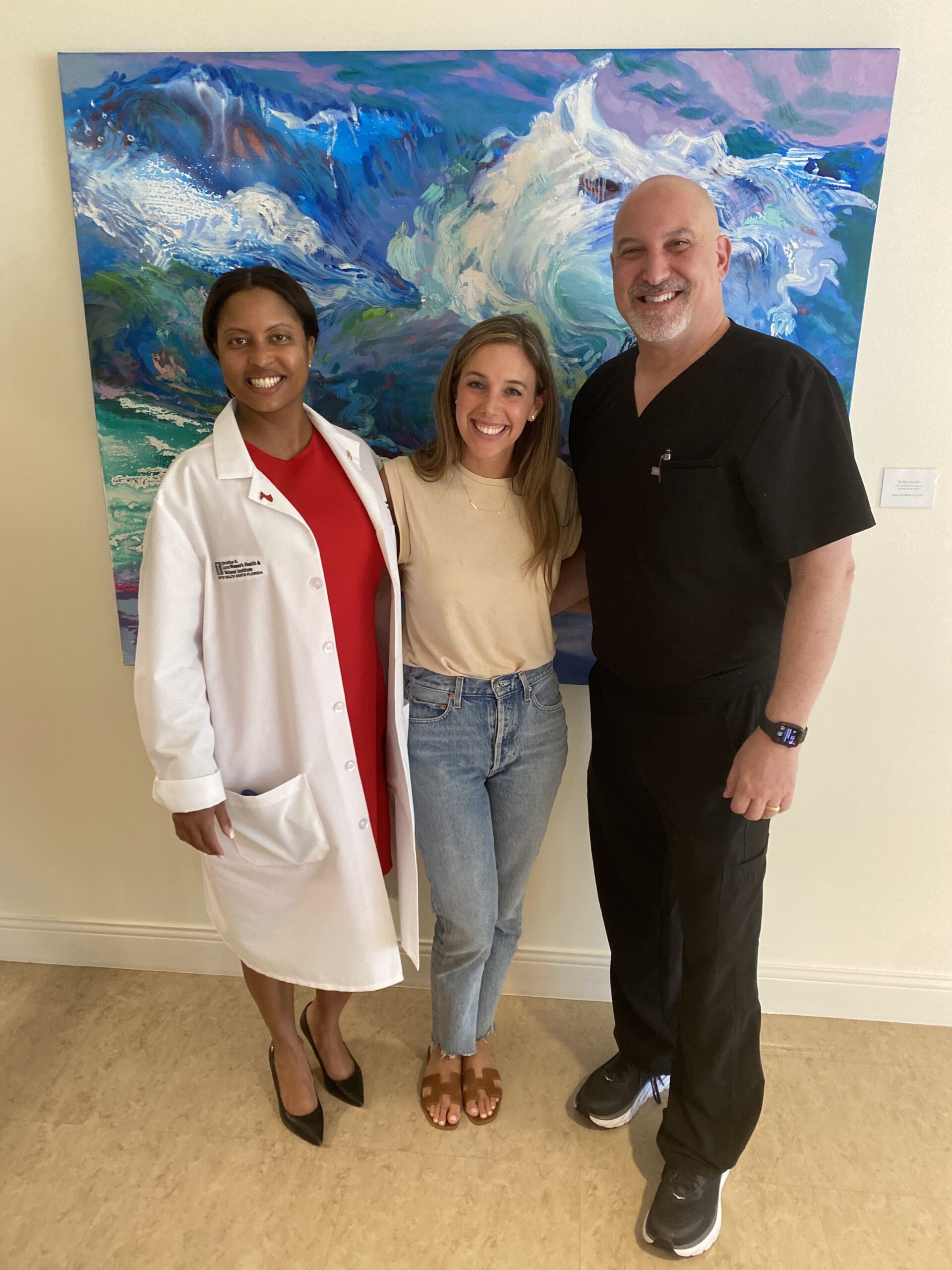Preeclampsia Awareness
I recently had the honor of getting to speak with two of the most knowledgable and well-respected physicians in their respective fields regarding preeclampsia. Dr. David Lubetkin, M.D., FACOG is a OB/GYN and Dr. Heather Johnson, M.D., FACC specializes in preventative cardiology. It’s so important to spread awareness and make women aware of pregnancy and postpartum related high blood pressure and preeclampsia. I had an in-depth conversation with these brilliant physicians and we went into detail about everything surrounding preeclampsia.
Many people are familiar with preeclampsia, but there may be some people here who are not so familiar with it. Dr. Lubetkin, can you please explain what this condition is?
Preeclampsia is pregnancy-induced hypertension. There’s a series of changes that happen in the body that cause a whole series of events:
- blood pressure goes up
- increased protein in the urine
- swelling, most notably in the face and the hands
What causes preeclampsia?
Nobody really knows what really causes preeclampsia.
Which people are at higher risk of preeclampsia?
- First time moms
- People who have a history of preeclampsia
- People who have multiple gestations
- People who have a history of chronic hypertension
- People who are at a higher weight
- Rhemautological conditions
Dr. Johnson noted that instead of just waiting for preeclampsia, she focuses on prevention. Dr. Lubetkin said that anyone who is at risk for preeclampsia he know is giving baby aspirin daily to those patients by 12 weeks. It has been shown to reduce the chance of preeclampsia.
What are the warning signs of preeclampsia?
- Preeclampsia can come any time after 20 weeks.
- Patients come in for their routine visit and all of the sudden they have high blood pressure.
- 140/90 is considered mild preeclampsia
- 160/100 is considered severe preeclampsia
- Swelling of the hands and feet
- Protein in the urine
- Headaches
- Blurry vision
- Right upper quadrant pain related to their liver getting swollen
Do you see signs of preeclampsia before 20 weeks of pregnancy?
If a patient starts off their pregnancy with elevated high blood pressure before 20 weeks they’re probably chronic hypertensive and not preeclampsia. You have to differentiate the people who have chronic hypertension and those who have superimposed preeclampsia.
What do you do if someone has high blood pressure early on in pregnancy?
If someone has chronic high blood pressure early on in pregnancy Dr. Lubetkin says it’s important to get them on hypertensive medication. Dr. Johnson stated that there’s an entire algorithm for it. There’s a focus on realizing when you have a high risk mom in front of you regarding overall vascular health that plays a role too. There’s plenty of anti-hypertensive medications out there, but it’s really important for those are are preexisting hypertensives if they’re on a medication that’s not safe for pregnancy that they meet with someone and get on a medication that is safe for pregnancy before they conceive. Dr. Johnson is a major advocate of a preconception visit if possible just to help with that transition. Preexisting hypertensives must meet with someone and get on a medication that’s safe before they conceive.
What is considered hypertension in pregnancy?
140/90 or higher. 140/90 is considered mild and 160/100 is considered severe.
What percentage of pregnant women does preeclampsia affect?
Dr. Lubetkin didn’t have a number, but did say that it has increased in the past few years.
Something I recently learned that I think most people are not aware of is postpartum preeclampsia (which means a women gets diagnosed with preeclampsia AFTER in the postpartum period. Can you please tell us more about that?
Some women have postpartum preeclampsia and symptoms usually occur within 24 – 48 hours after delivery, but sometimes it’s not until 5 days after delivery. It can happen any time up to six weeks postpartum. If a woman has sudden very high blood pressure during the six week postpartum period they should go to the hospital. Dr. Johnson noted that home blood pressure monitoring is so important and also knowing the symptoms. Dr. Lubetkin tells patients to go to CVS, Walgreens or Amazon and get a home blood pressure monitor kit just so you can check your blood pressure at home.
I actually wasn’t even aware that preeclampsia can occur AFTER giving birth, so thank you to Dr. Lubetkin and Dr. Johnson for bringing that to my attention. If I wasn’t aware that probably means that many women aren’t aware either, so I’m really glad I get to spread awareness about this topic so it’s something people can be on the lookout for. New moms are so focused on the baby and breastfeeding in those first few weeks, that it’s easy to ignore what’s going on in their own bodies.
The ultimate goal is to prevent preeclampsia from becoming eclampsia, which is when people are having seizures can lead to significant complications.
Dr. Johnson, can you please explain how preeclampsia affects your heart and how having high blood pressure affects your heart?
Preeclampsia is one of the types of high blood pressure disorders during pregnancy. Having preeclampsia during pregnancy becomes a risk factor for heart attacks, stroke and heart failure down the road (even within just 10 – 15 years after delivery) – it’s called premature early heart disease. There’s been growing research about the importance of monitoring blood pressure during pregnancy and having preventative care.
Dr. Lubetkin, what do you recommend women with high blood pressure with preeclampsia do until the baby can be safely born in addition to being on medication?
The obstetrician has to balance the risk of prematurity versus the need for delivery because we know the only cure for preeclampsia is delivery. If someone has preeclampsia over 37 weeks its automatic delivery. If someone has preeclampsia 34 weeks and above the doctor watches the patient closely, but most likely they’re going to need to be delivered if the doctor can’t prevent them from becoming severe preeclampsia.
The problem comes when you have someone under 34 weeks and they have severe preeclampsia and you try to manage them, and keep them pregnant, and nothing is helping their blood pressure. If someone comes into the hospital and their blood pressure is elevated and you give them intravenous medications to get their blood pressure down. If it works that’s great and then you can get them steroids to help the baby’s lungs mature and get them on magnesium to prevent seizures. In this situation you can keep a close eye on them and see what happens. If their blood pressure doesn’t come down with intravenous medication you have no choice but to deliver them. It’s remarkable that as soon as the baby comes out their blood pressure drops down almost immediately.
Unfortunately you have these situations sometimes where you have no choice. Dr. Lubetkin shared a story about a women who was 24 weeks and 5 days pregnant. She came into his office and her blood pressure was 240/120. He gave her medicine and nothing would help, and he had no choice at that point but to delivery the baby. The baby was born at 1lb & 12 oz. Amazingly enough Dr. Lubetkin saw the kid now 8 years old running around his office with his mother the other day which I found to be a truly incredible story. The advances in neonatal medicine have taken these babies that are so premature and for the most part these babies are doing really well.
Is there anything pregnant women can do to reduce their risk or prevent getting preeclampsia?
Preeclampsia doesn’t discriminate and it can happen to really healthy women. The best thing we can do is identify the people who are at high risk of developing preeclampsia and put them on baby aspirin. They encourage women to live a healthy lifestyle all the time – before pregnancy and during pregnancy. Physical activity is important and pregnancy is not a time you can consume everything you want to consume, especially if someone is coming in with already high blood pressure. They try to highlight that lifestyle can play a role.
The fluctuation of blood pressure immediately after delivery and who may rise after we still have a lot to learn.
Can high-stress cause preeclampsia or be a factor?
Dr. Lubetkin doesn’t think that stress has anything to do with it, while Dr. Johnson says there is some research (not causation), but there has been a correlation as far as increased vascular stiffness. There are some smaller trials out that have looked at association of home stressors, life stressors, increased environmental stress which may lead to vascular irritability. It is important to manage stress. I really appreciated the two different opinions on this and I think we will learn more with research and trials in the years to come.
What is the protocol once a woman is diagnosed with preeclampsia?
When someone has mild preeclampsia and we want to try to keep them pregnant there’s a few things that we tell them to do to try to keep them pregnant and one of those things is left-sided bed rest. has been one of the only things shown to reduce blood pressure significantly during pregnancy other than medication. It’s not just absolute numbers that Dr. Lubetkin looks at, but it’s a trend upward in their blood pressure. For example if someone is running 95/65 which might be absolutely normal in pregnancy for them and then they come in and all of the sudden they’re 120/80 for them that’s a trend that they’re starting to rise and we need to keep an eye on these things and we tell them to watch their salt, drink lots of fluids, get left sided best rest. Bed rest is a major factor in prolonging pregnancy. Only get out of bed for meals and to go the bathroom, otherwise, there’s no need to get out of bed.
Does having preeclampsia change anything in regards to labor and delivery besides delivering the baby at 37 weeks?
Dr. Lubetkin looks at every situation individually. For example, if someone comes in and it’s their third baby, and they’re already a couple centimeters dilated, and their preeclampsia isn’t too severe Dr. Lubetkin has no problem letting them try to delivery vaginally. However, if a patient comes in at 34 weeks, and their blood pressure is very high, and it’s their fist baby, and their cervix is closed, and you know it’s going to be 24 hours of labor to get the baby out and you don’t have 24 hours because the woman has severe preeclampsia and could start having a seizure, then the answer is to delivery by cesarian section. It’s really on a case-by-case basis.
Can you weigh the risks of early delivery versus the risk of continued preeclampsia symptoms?
That is all determined by whether the preeclampsia is mild or severe, what the symptoms are, and what the risk is of the woman going from preeclampsia to eclampsia. Balancing the risks of prematurity versus delivery. If it’s mild preeclampsia Dr. Lubetkin still does not want his patients going past 37 weeks.
After the baby is born what is the protocol for the mother?
Dr. Lubetkin usually keeps the mother on magnesium (delivered intravenously) for 24 hours after delivery. The purpose of the magnesium is to prevent seizures. If the blood pressure goes down after the 24 hours on magnesium Dr. Lubetkin likes to keep them in the hospital for an additional 24 hours to keep an eye on them and then they can be sent home without medication, but with home blood pressure monitoring. 48 hours should be the minimum hospital stay after delivery.
If the mother’s blood pressure remains elevated after 24 hours on magnesium, then he starts them with oral anti-hypertensive medications so they can send them home with a safe blood pressure and follow ups in the office every week.
Dr. Johnson stated the importance that EVERYONE monitors their blood pressure at home after delivery, even if they didn’t have preeclampsia or high blood pressure during pregnancy.
What does follow-up after delivery typically look like? How soon after giving birth should the patient see you?
General guidelines is that obstetrician is the woman’s primary care doctor until they’re 6 weeks postpartum. After 6 weeks if they’re still having a problem then they go to a specialist like Dr. Johnson. She will work with patients on preventative efforts regarding long-term health.
What are the long-term effects of preeclampsia and how can women manage these effects?
As noted above, having preeclampsia during pregnancy becomes a risk factor for heart attacks, stroke and heart failure down the road (even within just 10 – 15 years after delivery), which is called premature early heart disease. Dr. Johnson can’t stress enough how important it is to monitor blood pressure during pregnancy and having preventative care.
For more informative on the physicians:
Heather M. Johnson, MD, MMM, FAHA, FACC, FASPC is a Preventive Cardiologist at the Christine E. Lynn Women’s Health & Wellness Institute of Boca Raton Regional Hospital and Baptist Health South Florida, and Clinical Affiliate Associate Professor of Florida Atlantic University. She earned her Bachelor of Science in Molecular Biology, Master of Population Health, and Doctor of Medicine degrees at the University of Wisconsin-Madison. She graduated with Honors from the University of Southern California Marshall School of Business with a Master of Medical Management. Prior to joining the Lynn Women’s Institute, she practiced as a General Cardiologist and Preventive Cardiologist for 10 years at the University of Wisconsin Hospital.
Dr. Johnson is a leader in population health, heart disease prevention, and women’s health with over 50 research publications. She serves as a grant reviewer for the National Institutes of Health (NIH).
Dr Johnson is active with multiple medical organizations including the American Heart Association, American College of Cardiology, American Society of Preventive Cardiology, and WomenHeart. She is a guest medical expert on television newscasts, radio shows, and podcasts and has received numerous awards. Notably, in 2018, Dr. Johnson was inducted into the Alpha Omega Alpha Honor Medical Society and in 2019, she was inducted into the Beta Gamma Sigma International Business Honor Society.







